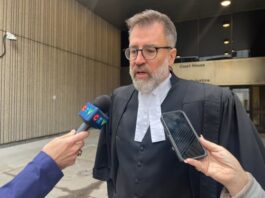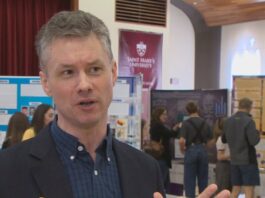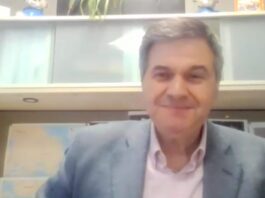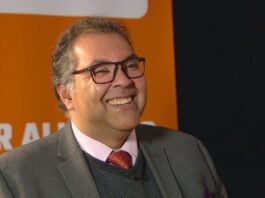
Iethiiehiá:rons means ‘we raise them’ in Kanien’kéha (Mohawk language) and is the name of a project that supports parents raising their children with Kanien’kéha as their first language.
Four families just completed the first year of the pilot program.
Taiawentón:ti Chelsea Sunday, who is from Akwesasne, on the Ontario-Quebec-New York state border, is also co-founder of Ionkwahronkha’onhátie’ (We’re becoming fluent), an adult language program.
She and her co-founders Karonhiióstha Shea Sky and Kaienkwinehtha Ransom wanted to create a space for language learners to continue their language journey outside of Kanien’kéha immersion programs.
“All the first language speakers are dying and there’s this panic, right?” she said.
“In communities, they’ve already experienced the loss of the last first language speaker and it’s heartbreaking.”
Sunday said this has created a sense of urgency and unease among language learners.
“We’re now in a race against time to get the language as fast as you can and record everything you can,” she said.
“My thought was, well, we can raise them too, right?”
This was was the inspiration for Iethiiehiá:rons.

She is raising her toddler as a first language speaker.
“He is picking it up and it’s just crazy,” she said.
“It feels like you go back in time, and you get to see what it was like for my grandmother’s mother who raised her children in the language.”
Learning together
Nihahsennaa Peters, who is Onondaga, Snipe Clan from Akwesasne, is from an unbroken line of Kanien’kéha speakers. He and his wife, Iehsontenhawe Elisha King are raising their son and baby on the way in the language.
King said her decision to learn Kanien’kéha so she could pass it on to her children was an easy one. She is currently enrolled in Á:se Tsi Tewá:ton adult immersion program in Akwesasne.
“We decided that it was really important that he be given as much language as possible,” she said of her son.
“So Nihahsennaa spoke to him from the time he was in my belly until he was here, and after that he spoke to him 90 per cent in Kanien’kéha.”

They were homeschooling their five-year old son when Peters was offered a fellowship to be a part of Iethiiehiá:rons.
“I was so blown away that there’s even like an opportunity like this,” he said.
Some of the families in Iethiiehiá:rons were already involved in language revitalization. Other families were chosen to participate because they had babies on the way.
“Our focus is on mothers of new babies because that is who needs the most support and the new babies are in their prime time for language acquisition,” said Sunday.
Families meet regularly
One or both parents must be advanced-level Kanien’kéha speakers and be able to converse easily while discussing complex subject matters. The families were encouraged to interact with relatives who are also first language speakers to preserve the family’s unique dialect through natural language transmission.

Existing Kanien’kéha resources from surrounding Kanien’kehá:ka (Mohawk) communities were used, such as books, flash cards and language videos. The families also created their own resources as part of their role as a language fellow.
Families in the program meet regularly to plan their calendars, brainstorm seasonal activities, and make resources. If they plan to spend a day in the sugar bush, tapping maple trees, the families will determine what vocabulary will be needed for the day based on their child’s engagement and resources would be created for this.
Iethiiehiá:rons is able to provide some parents with fellowships funded in part through Canadian Heritage and Ontario Trillium Foundation grants as well as donations.
The program will continue next year, refining it based on parents’ feedback. Sunday said they hope to bring in new moms and support them over the next couple years based on funding available.
“You need to engage in conversation if you want your fluency to increase,” said Sunday.
“All the people I always wanted to speak to are all gone unfortunately, but it’s created this connection with them even though they’re not here.”












